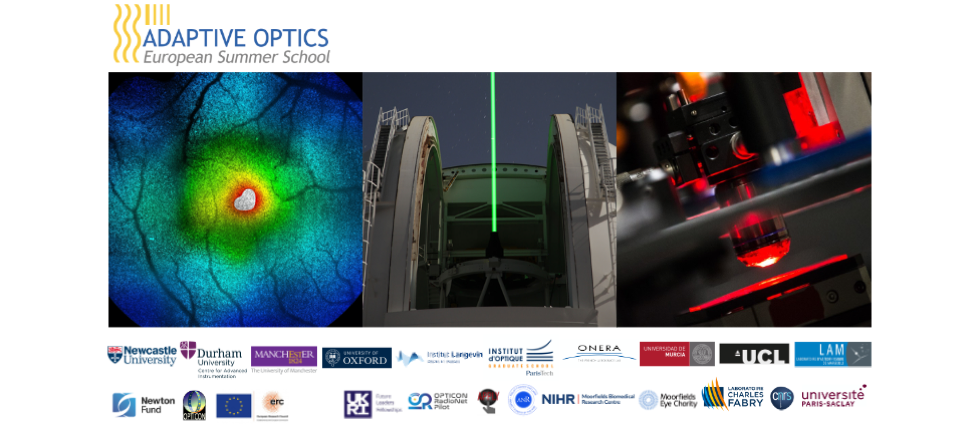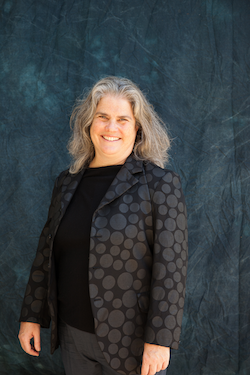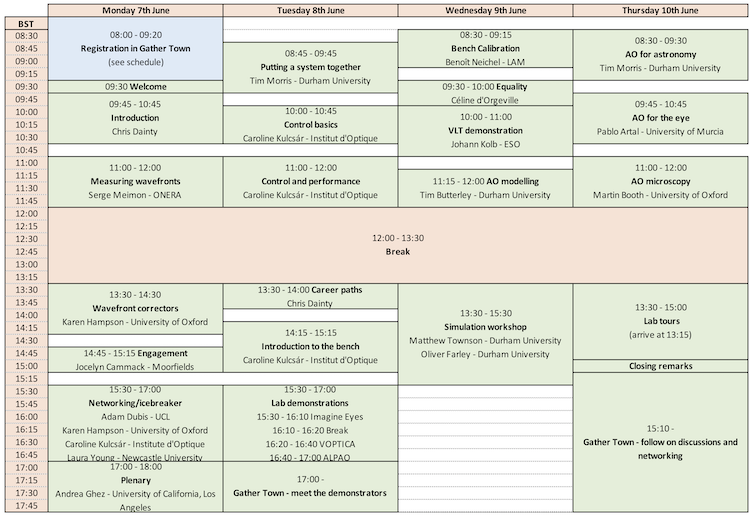
|
|
|
Past summer schools > 2021 summer school2021 Summer School Plenary talk by Nobel Laureate Prof. Andrea Ghez Our Galactic Center: A Unique Laboratory for the Physics & Astrophysics of Black Holes The proximity of our Galaxy's center presents a unique opportunity to study a galactic nucleus with orders of magnitude higher spatial resolution than can be brought to bear on any other galaxy. After more than a decade of diffraction-limited imaging on large ground-based telescopes, the case for a supermassive black hole at the Galactic center has gone from a possibility to a certainty, thanks to measurements of individual stellar orbits. The rapidity with which these stars move on small-scale orbits indicates a source of tremendous gravity and provides the best evidence that supermassive black holes, which confront and challenge our knowledge of fundamental physics, do exist in the Universe. This work was made possible through the use of speckle imaging techniques, which corrects for the blurring effects of the earth's atmosphere in post-processing and allowed the first diffraction-limited images to be produced with these large ground-based telescopes. Further progress in high-angular resolution imaging techniques on large, ground- based telescopes has resulted in the more sophisticated technology of adaptive optics, which corrects for these effects in real time. This has increased the power of imaging by an order of magnitude and permitted spectroscopic study at high resolution on these telescopes for the first time. With adaptive optics, high resolution studies of the Galactic center have shown that what happens near a supermassive back hole is quite different than what theoretical models have predicted, which changes many of our notions on how galaxies form and evolve over time. By continuing to push on the cutting-edge of high-resolution technology, we have been able to capture the orbital motions of stars with sufficient precision to test Einstein’s General theory of Relativity in a regime that has never been probed before. Andrea's Biography
Andrea M. Ghez, professor of Physics & Astronomy and Lauren B. Leichtman & Arthur E. Levine chair in Astrophysics, is one of the world’s leading experts in observational astrophysics and heads UCLA’s Galactic Center Group. Best known for her ground-breaking work on the center of our Galaxy, which has led to the best evidence to date for the existence of supermassive black holes, she has received numerous honors and awards including the Nobel Prize in 2020, she became the fourth woman to be awarded the Nobel Prize in Physics, sharing one half of the prize with Reinhard Genzel (the other half of the prize being awarded to Roger Penrose). The Nobel Prize was awarded to Ghez and Genzel for their Independent discovery of a supermassive compact object, now generally recognized to be a black hole, in the Milky Way's galactic center, the Crafoord Prize in Astronomy from the Royal Swedish Academy of Science (she is the first woman to receive a Crafoord prize in any field), Bakerian Medal from the Royal Society of London, a MacArthur Fellowship, election to the National Academy of Sciences, the American Academy of Arts & Sciences, and the American Philosophical Society. Her work on the orbits of stars at the center of the Milky Way has opened a new approach to studying black holes and her group is currently focused on using this approach to understand the physics of gravity near a black hole and the role that black holes plays in the formation and evolution of galaxies. Advances in high resolution imaging technology enabled Ghez’s work and her group continues to work on pushing the frontiers of these technologies forward. She serves on several leadership committees for the W. M. Keck Observatory, which hosts the largest telescopes in the world, and the future Thirty Meter Telescope. Ghez is also very committed to the communication of science to the general public and inspiring young girls into science. Her work can be found in many public outlets including TED, NOVA’s Monster of the Milky Way, Discovery’s Swallowed by a Black Hole, TED, and Griffith Observatory. Ghez earned her B.S from MIT in 1987, and her PhD from Caltech in 1992 and has been on the faculty at UCLA since 1994. For more information see http://www.galacticcenter.astro.ucla.edu and http://www.astro.ucla.edu/~ghez Photo credit: Annette Buhl
Live demos with Imagine Eyes, ALPAO and VOPTICA Demos of instruments and components from Image Eyes, ALPAO and VOPTICA will take place live. An original opportunity to meet these companies that are at the forefront of technology and to learn more about their activities!
2021 Programme Timezone: BST (UTC +1)
Pre-recorded topics Imaging through complex media - Alexandre Aubry, Institut Langevin Free space optical communications - Andrew Reeves, DLR Machine Learning - Carlos González-Gutiérrez - University of Oviedo Adaptive Optics based visual simulators. Applications for Presbyopia and Myopia - Maria Vinas, Harvard Medical School Sensorless AO - Qi Hu, University of Oxford Laser fabrication - Patrick Salter, University of Oxford
Lab tours Astronomy Laboratoire d’Etudes Spatiales et d’Instrumentation en Astrophysique (LESIA) - Paris, France Laboratoire d’Astrophysique de Marseille (LAM) - Marseille, France Osservatorio Astrofisico di Arcetri - Florence, Italy https://www.arcetri.inaf.it/en/about-us/organization Centre For Advanced Instrumentation, Durham University - Durham, UK
Microscopy Institut für Mikrosystemtechnik (IMTEK) - Freiburg, Gerrmany Institute of Biomedical Physics, University of Innsbruck - Innsbruck, Austria https://www.i-med.ac.at/dpmp/bmp/ Dynamic Optics and Photonics, Department of Engineering, University of Oxford - Oxford, UK
Vision/Ophthalmology Institute of Ophthalmology, University College London - London, UK Advanced Optical Imaging Group, University of Dublin - Dublin, Ireland https://www.ucd.ie/advancedopticalimaging/ Office National d'Etudes et de Recherches Aérospatiales (ONERA) - Paris, France https://parisgroup.webstarts.com/index.html AO Vision Lab, University of Bonn - Bonn, Germany
|
| Online user: 2 | Privacy |

|



